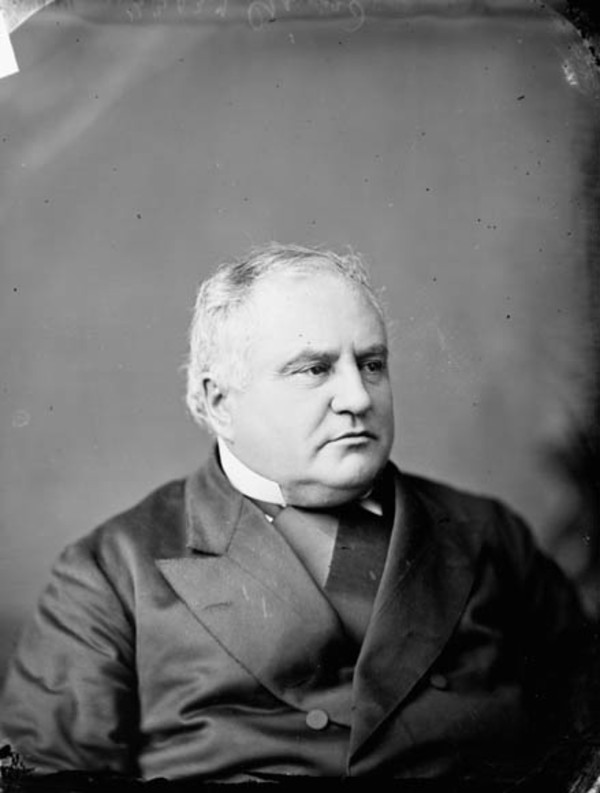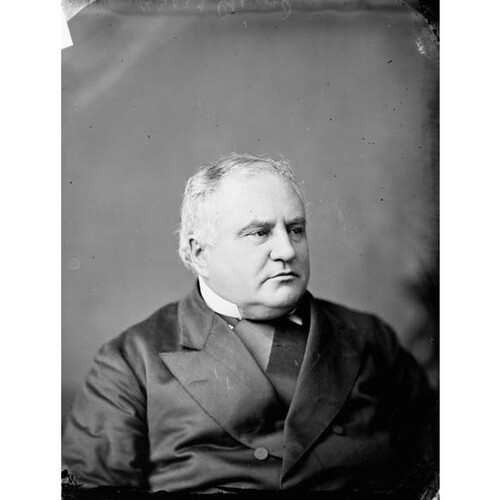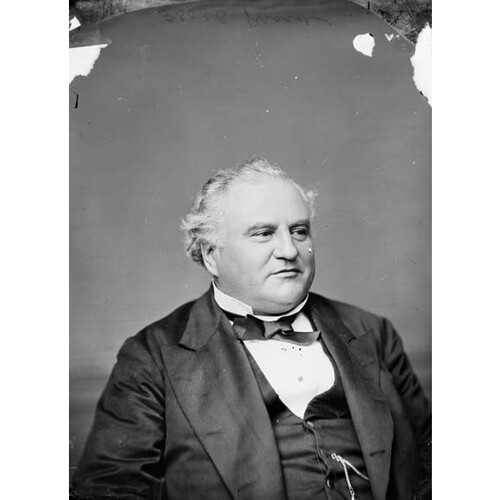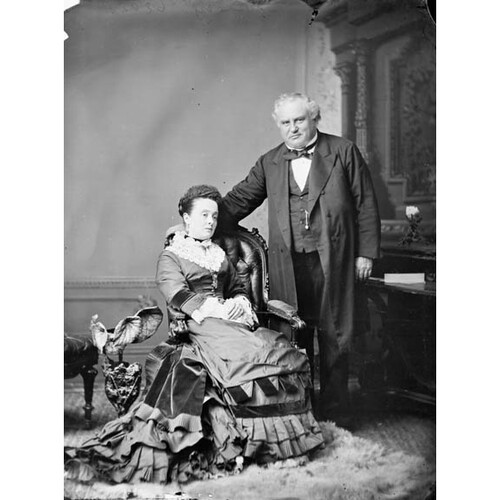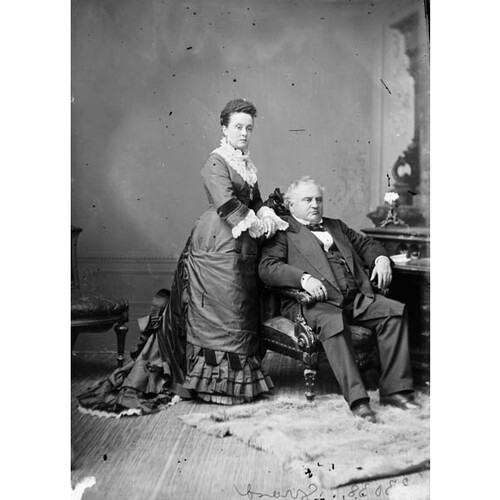GIRARD, MARC-AMABLE, notary, office holder, politician, and lawyer; b. 25 April 1822 in Varennes, Lower Canada, the fifth of six children and only son of Amable Girard, a farmer, and Josephte Daunais; m. 23 Sept. 1878 in Montreal Marie-Aurélie de La Mothe, widow of Alfred Versailles, and they had one son who died in infancy and one daughter; d. 12 Sept. 1892 in St Boniface, Man.
Marc-Amable Girard entered the Collège de Saint-Hyacinthe in 1831. Eight years later he was articled to notary Louis Lacoste* at Boucherville. During 1840 he spent some time in Middlebury, Vt, “in order to get familiar with the English language.” In 1843 Lacoste, a supporter of Louis-Hippolyte La Fontaine*, was elected to the Legislative Assembly and he left young Girard to look after his practice. After being admitted as a notary on 12 February of the following year, Girard returned to Varennes, where he practised for 26 years. From 1859 to 1870 he served as a trustee of the Board of Notaries of Montreal. He speculated in land in Varennes and held office there as a school commissioner, municipal councillor, and mayor. Throughout his life he retained a strong sentimental attachment to his native parish, and to the cult of its patron, St Anne.
Varennes was located in Verchères, the first electoral district that George-Étienne Cartier* contested and won, in 1848. Girard had helped persuade Cartier to become a candidate. He and Lacoste would become followers of Cartier in his evolution from a supporter of La Fontaine to the leader of the Conservatives in Quebec. Girard himself attempted, without success, to win election in the Montreal region, to the Legislative Council in 1858 and to the Legislative Assembly in 1863. His views in 1863 were similar to some he would later advocate in Manitoba. He favoured economy in government spending and reduction of the public debt, the encouragement of agriculture by avoiding direct taxes on property, equal representation for Lower and Upper Canada, and an efficient militia.
In 1870 the Manitoba Act was passed, providing for the creation of the province and its union with Canada on 15 July. To Cartier, who had guided the bill through the House of Commons, it was essential that some younger French Canadian professionals should immigrate to the new province without delay to provide leadership for the Métis. It was natural that he should think of his friend Girard, a highly successful notary and land dealer, now 48 years old, unmarried, bilingual, and reliably conservative in politics and religion. Bishop Alexandre-Antonin Taché of St Boniface, Girard’s friend from student days, added his influence. Cartier and Taché also urged Irish Catholic Henry Joseph Clarke* to go west and recruited Joseph Royal*, a lawyer and ultramontane journalist. Joseph Dubuc*, who went to Manitoba in June 1870, departed with Cartier’s encouragement. All from the Montreal region, they were sometimes referred to as “Cartier’s young men.” Girard was the eldest.
Travelling with Taché and Royal, Girard reached St Boniface on 23 Aug. 1870. That evening he and Royal crossed the Red River to speak for ten minutes with Métis leader Louis Riel* in Upper Fort Garry (Winnipeg). In the morning Riel fled south as Colonel Garnet Joseph Wolseley* and his troops, sent by the government of Canada, entered the fort from the north. More than a week later the first lieutenant governor, Adams George Archibald, arrived and began to organize a provincial government. In the aftermath of the insurrection there was much unrest in the province and Archibald gave priority to a policy of conciliation, treating French-speaking Catholics and English-speaking Protestants equally. Acting as his own premier, he made his first appointments to executive office on 17 September: Alfred Boyd* was named provincial secretary and Girard, representing the “French party,” was made provincial treasurer. On 13 December Archibald proclaimed 24 electoral districts, 12 with Catholic majorities and 12 with Protestant majorities. (A census taken earlier that year had shown these two religious groups to be almost equal in number.) As Archibald’s leading Catholic candidate, Girard was elected by acclamation on 27 December in the most important Catholic riding, St Boniface East. Clarke, Royal, and Dubuc were also returned by acclamation.
Internal differences soon began to develop within the group, particularly with regard to Riel. Girard felt that the policy of conciliation would succeed if Riel could be persuaded to avoid drawing attention to himself, and he urged the Métis leader, who returned to Manitoba in May 1871, “For the sake of your country and your friends, absent yourself for a while from the country.” Dubuc, the most radical of the young French Canadians, thought that Girard was too timid. The previous month in a letter to Riel he had described Girard as “to say the least a fool. His first principle is to please the English.” But Girard’s view that Riel’s return to the vicinity of St Boniface was “extremely imprudent” was eventually proved correct.
On 5 October a small band of Fenians under William Bernard O’Donoghue* raided Manitoba from the United States. They received no support from the Métis. Girard accompanied Archibald on a visit to St Boniface to review Métis horsemen who had turned out to defend the colony. Without actually naming them, Girard presented the leaders, among whom was Riel, to the lieutenant governor, who shook hands with them all. The widespread publicity the incident gave to the continued presence of Riel, and the outrage it provoked in Ontario, did not help the governor’s policy of reconciliation.
Meanwhile, Girard was playing a prominent role in Manitoba. On 8 May 1871 he was admitted as attorney and barrister, thus becoming the first member of the Manitoba bar. On 29 June he was made a commissioner to administer oaths of allegiance and office. In November Archibald finally sent Prime Minister Sir John A. Macdonald his recommendation for the appointment of a senator from the French section of the population. Unfortunately, he said, “the resident [Métis] population have nobody among themselves really fit for the position.” The best candidate, Girard, although not the most acceptable to either the Métis or the settlers of English origin, “has been true as steel ever since he came here. He is a little out of the Bishop’s good graces because not quite so pliant as he was expected to be.” On 13 December Girard was summoned to the Senate. He resigned from the Executive Council of Manitoba on 14 March 1872 (to be replaced by Royal) but kept his seat in the assembly. On 12 April, as a supporter of Macdonald’s Conservative government, he moved the Senate’s address in reply to the speech from the throne. While attending parliament, he was able to make frequent visits to Varennes. Another federal appointment came on 28 Dec. 1872, when the Council of the North-West Territories was created with both executive and legislative powers to aid the lieutenant governor. Girard was the first member appointed. Others included Clarke, Boyd, Dubuc, Pascal Breland, John Christian Schultz, Donald Alexander Smith*, and Andrew Graham Ballenden Bannatyne*.
Riel’s presence continued to unsettle Manitoba politics. Although his increasing political activity worried Girard, the senator joined with Royal, Dubuc, and Alphonse-Alfred-Clément La Rivière*, a recently arrived French Canadian, in extending to Riel a formal invitation to be a candidate in a by-election in Provencher caused by the death of its member, Cartier. Riel was elected by acclamation in October 1873. In the federal general election of February 1874 he was again elected in Provencher, only to be expelled from the House of Commons. In the by-election of September 1874, caused by this expulsion, Riel was elected for a third time. This persistence on the part of the solidly French constituency of Provencher angered an increasingly large percentage of English-speaking voters in Manitoba as well as in Canada as a whole. On 19 May 1874 Girard had given evidence sympathetic to Riel before a select committee of the house; he had also played a leading role in demanding an amnesty for him from the federal government, but to no avail. Finally, in 1875 Riel was declared an outlaw.
At the provincial level the conciliatory policy that Archibald’s successor, Alexander Morris*, had inherited in December 1872 was becoming increasingly difficult to maintain. Immigration of Protestants had vastly exceeded that of Catholics, and representation in the legislature on a denominational basis was no longer even roughly in proportion to population. The political crisis reached a climax on 2 July 1874 when the minister of public works and agriculture, John Norquay*, presented a new bill to redistribute the electoral districts, since a revision adopted in 1873 had been hastily prepared. The following day the English-speaking section of the opposition, led by Edward Henry George Gunter Hay, decided to join with the French, now led by Dubuc, and carried a motion of non-confidence in the government. Girard voted with the French party.
On the lieutenant governor’s advice, each member of the ministry submitted his resignation. Morris then chose Girard as Manitoba’s first premier. He was the only member of the opposition with previous experience as an executive councillor. Moreover, he had not voted on an amendment to the redistribution bill of 1873 proposed by Royal over which Protestant and Catholic members had opposed each other. Since he was to lead a coalition of two parties based upon religion or language rather than upon policy, Girard formed his new administration primarily on those terms. He increased the Executive Council from five to six so as to give the rapidly growing Protestant population equal representation: Girard and Hay, regarded as the French and English leaders respectively, Dubuc and Robert Atkinson Davis*, and, from the Legislative Council, the Catholic James McKay* and the Protestant Francis Ogletree. Morris called the attention of the secretary of state, Richard William Scott*, to the fact that the government had been formed by means of a premier, a practice that had introduced “responsible Government in its modern type into the Province – The previous ministry was selected personally by my predecessor and none of its members were recognized as first minister.”
In announcing the new ministry on 8 July 1874 Girard outlined its policies: reduction of government expenditures, introduction of an effective system of auditing public accounts, abolition of the Legislative Council, redistribution of electoral divisions, preparation of an accurate list of voters, definition of the equity powers of the Court of Queen’s Bench, and distribution of government printing by contract after tenders.
The new government was vulnerable in several ways. With an equal number of Catholics and Protestants in the Executive Council and a Protestant majority in the assembly, it was essential that Girard’s French party retain the confidence and good will of its English-speaking colleagues. Girard’s great misfortune was that his premiership coincided with continuous agitation by and on behalf of the irrepressible Riel, whose determination to take his seat in the House of Commons kept alive memories of the “troubles” only four years earlier. In these circumstances it was a serious mistake to have included Dubuc in the cabinet, let alone make him attorney general. A few weeks earlier Dubuc had been acting as attorney for Riel’s former lieutenant, Ambroise-Dydime Lépine*, charged with the murder of Thomas Scott* in 1870, and he was still Riel’s friend and political organizer. Girard and Dubuc continued to act conspicuously as French Canadians rather than as representatives of Manitoba as a whole. Girard’s presidency of the Association Saint-Jean-Baptiste de Manitoba identified him with one side in the still-bitter conflict over Riel.
Girard kept the legislature in session until 22 July. The government had the unanimous support of the French members, including Royal. The only difficult issue it faced was redistribution. A new bill, introduced by Hay, which followed closely the bill introduced by the former government but was drafted with greater competence, met with little opposition. There would be 14 English and 10 French districts. The principle of representation by population had been admitted by Girard, since it was the basis upon which Archibald had made the original divisions four years earlier. Although a private member’s attempt to disqualify senators from sitting in the provincial legislature (a measure that drew attention to Girard’s double mandate) was defeated in committee by only one vote, the bill itself, along with more than 20 others, passed easily and received royal assent.
On 3 Sept. 1874 Riel was again elected for Provencher. Most English-speaking Manitobans were outraged. A French-English coalition could not flourish in such an atmosphere, although there was little Girard could do. He could not control Riel, yet he was identified with him and with French and Catholic interests at a time when less than one-sixth of the province’s population spoke French. On 2 November Lépine was found guilty. The English element that held the balance in the assembly declared that it could not continue to support a government in which both the premier and the attorney general were not only French but also well-known friends and advisers of Riel.
Hay and Ogletree handed their resignations to Girard, McKay and Dubuc then did the same. The premier presented these resignations and his own to Morris and advised him to call on Davis, the only remaining minister, to form a government. Thus on 1 Dec. 1874, for the first time in Manitoba, a premier tendered the resignation of his cabinet. The Girard government had been formed to meet the emergency of July 1874. It had succeeded in getting the redistribution bill carried with “the full support of both races.” But five months later this first fully responsible government had collapsed because it had lost the support of the English party. Morris wrote to Prime Minister Alexander Mackenzie on 5 December: “I part with Girard, McKay, and Dubuc with regret. They have acted most loyally and displayed much disinterestedness.” Their political careers had been closely affected by the changes in the character of the province. Girard is reputed to have said, “I am the first French Premier of the Province, and it is my opinion I will be the last.” In Manitoba’s second general election, at the end of December 1874, Girard was elected by acclamation in St Boniface, now reduced from two members to one. His continued popularity there was not in doubt.
At Ottawa in 1877 parliament passed a bill to amend the North-West Territories Act. Before its third reading, while the Senate was in committee of the whole, Girard proposed an amendment, modelled on the Manitoba Act, providing for the use of either English or French in the debates of the territorial council, and in its records, journals, and printed ordinances, as well as in the courts of the territories. The amendment, reluctantly accepted by the House of Commons, was destined to be the subject of bitter debate in later years.
Girard had remained devoted to St Anne. In 1878, while on a pilgrimage to Sainte-Anne-de-Beaupré, Que., he met Marie-Aurélie de La Mothe, a widow from Montreal, whom he married later that year. According to the provisions of the marriage contract, Girard undertook to educate her two children. The children of their union, or if there were none, her children, would inherit his property in St Boniface. On 23 September in Montreal their marriage was celebrated by Bishop Édouard-Charles Fabre. Mme Girard would always prefer life in or near Montreal to that in St Boniface.
In October 1878 Girard announced that he would again stand for election to the Manitoba assembly. With the backing of Royal, now leader of the French party, he called a meeting of electors on 30 October. To his surprise, a well-prepared “citizen’s committee” demanded that their representative should give all his time to his provincial constituency. They apparently had the sympathy of the chairman of the meeting, Dubuc, who now held Provencher, the Franco-Manitoban seat in the House of Commons. La Rivière denounced Girard’s double mandate and declared that he would oppose the senator in the coming provincial election. Negotiations failed to change La Rivière’s mind and on the official nomination day, 11 December, he was elected by acclamation for St Boniface. For the first time since 1870 Girard had no seat in the assembly.
He was now free to give his full attention to federal politics, particularly to the building of the Canadian Pacific Railway. A strong supporter of the Conservative government’s railway policies and head of a special Senate committee on railways, he was influential in having the CPR pass through Winnipeg. In April 1879 he voted against a private member’s bill introduced in the Senate by Robert William Weir Carrall* to make 1 July a public holiday “by the name of Dominion Day” because the measure had not been proposed by the government. Despite the opposition of Girard and others, the bill passed.
The Norquay government emerged from the general election of 1878 with between 14 and 17 seats. Manitoba politics were not organized along the same party divisions as federal politics. Norquay and Royal, as well as Thomas Scott, the leading member of the opposition, were all federal Conservatives. But Norquay’s cabinet, like those of Girard and Davis before him, was based on a coalition of interests, and it had the support of the French-speaking members of the assembly. In late May 1879 Royal attempted to lead a coup in which a united French party, holding the balance of power, would ally with Scott’s English-speaking group and form the majority. But the plan collapsed because Norquay promptly rallied the support of all English-speaking members, including Scott’s group, and asked for the resignations of Royal and Pierre Delorme*, the other French-speaking cabinet minister. The French party then found itself completely isolated. When the lieutenant governor, Joseph-Édouard Cauchon*, insisted that the vacant cabinet seats be filled without delay, Norquay could only appoint two more English-speaking members, all the French members having opposed him.
The English-speaking members had rallied around a new anti-French policy which included a decision to dispense with the printing of public documents in French and to modify once more the electoral boundaries. Manitoba’s political parties would be divided along English-French lines unless Norquay could find a cabinet colleague who would represent the French-speaking element in the house and also accept this policy. He turned to Girard, who had been absent in Ottawa and Varennes during the crisis.
On 19 Nov. 1879 Girard was appointed provincial secretary. He accepted office on the conditions that the school system actually in operation would not be changed and that if a vacancy should occur in the cabinet another member of the French party would be appointed. He also struck a compromise with Norquay over the printing of official documents in French. Enthusiastic approval of Girard’s action came from all sides. His popularity and prestige had never been greater. Because he was trusted he had been able to save the French party from permanent opposition and, with Norquay, he had made possible the emergence of parties based mainly on policies rather than on language. The assembly was dissolved, and in the general election Girard was elected by acclamation on 9 December in Baie St Paul, a predominantly French-speaking constituency. The government was returned with an overwhelming majority.
For a while, as the man most responsible for tiding over the bitter feelings of “national prejudice,” Girard was treated as a statesman above criticism. Then on 16 Nov. 1881 La Rivière became provincial secretary, and Girard was named minister of agriculture and statistics. A government proposal to increase his salary in 1882 met with fierce protest from the newly formed Liberal opposition under Thomas Greenway*. Yet despite his increasing homesickness for Varennes, Girard stayed on as minister, drawing his salary as long as he could. He could not contest the election of January 1883 because of recent provincial legislation that disqualified senators as candidates for the assembly, and on 6 September he resigned as executive councillor and as minister.
In March 1886 Girard made a major speech in the Senate on the North-West rebellion, condemning the insurrection during which lives had been sacrificed “for the maintenance of this Dominion of ours.” He also viewed the agitation that had taken place in Quebec over the execution of Riel as “prejudicial to the interests of Manitoba and the North-West.” In his moderate views he differed from Senator François-Xavier-Anselme Trudel*, ultramontane leader of the Quebec Castor wing of the Conservative party, whom in the past he had recognized as his leader.
The period of expansionist Conservatism that had produced the career of Girard was ending. In 1887 Honoré Mercier’s Liberals came to power in Quebec, the following year Greenway’s Liberals were elected in Manitoba. The old order was going, but its champions were still prepared to do battle over the issues of schools and language. In April 1890 Girard entered into the debate over amendments to the North-West Territories Act introduced by D’Alton McCarthy. Girard was one of a small minority in the Senate who did not want the Legislative Assembly of the North-West Territories to have the power to regulate the use of French or English in its proceedings. The disappearance of the French language was inevitable, he felt. “We look forward to a day when the use of the French language will disappear, but we prefer that that should be the work of time and not the work of men who are now living.” “The present government of Manitoba,” he explained, “has dealt harshly with the French minority.” Later in 1890 Girard was elected president of the Congrès National, a meeting in St Boniface of representatives from the French Canadian and Métis national societies throughout the province. The delegates passed resolutions protesting against the legislation of Greenway’s government abolishing the province’s dual public school system and against the decline of the French language. Two years later, in August, he again summoned a meeting of the Congrès National to renew the protests of Manitoba’s French-speaking élite. He died the following month, before its executive committee forwarded a petition to the governor general in council.
Marc-Amable Girard was buried in the grounds of the cathedral of St Boniface, a few steps away from the grave of Riel. He shares a stone with his stepson, Dr Alfred Versailles; it does not mention that he was born in Varennes or that he became premier of Manitoba.
Marc-Amable Girard’s minute-book for 1844–70 is at ANQ-M, CN1-178.
ANQ-M, CE1-10, 26 avril 1822; CE1-33, 23 sept. 1878; P-5. NA, MG 27,I, C8; F3. PAM, MG 3, D1; D2; MG 12, A; B1; B2; MG 13, A; MG 14, B26. Can., House of Commons, Journals, 1874, app.6; Senate, Debates, 1872–92. Man., Legislative Assembly, Journals, 1871–82; [Sessional papers], 1871–83. J. H. O’Donnell, Manitoba as I saw it, from 1869 to date, with flash-lights on the first Riel rebellion (Toronto, 1909). Daily Free Press (Winnipeg), 1872–September 1892. Le Manitoba (Saint-Boniface), 1881–14 sept. 1892. Le Métis (Saint-Boniface), 1871–81. Canadian directory of parl. (Johnson). CPC, 1871–92. Cyclopædia of Canadian biog. (Rose and Charlesworth), vol.1. Alexander Begg, History of the north-west (3v., Toronto, 1894–95). C.-P. Choquette, Histoire du séminaire de Saint-Hyacinthe depuis sa fondation jusqu’à nos jours (2v., Montréal, 1911–12). Dale and Lee Gibson, Substantial justice; law and lawyers in Manitoba, 1670–1970 (Winnipeg, 1972). J.-E. Roy, Histoire du notariat au Canada depuis la fondation de la colonie jusqu’à nos jours (4v., Lévis, Qué., 1899–1902), 3: 247, 292, 321, 336.
Cite This Article
G. O. Rothney, “GIRARD, MARC-AMABLE,” in Dictionary of Canadian Biography, vol. 12, University of Toronto/Université Laval, 2003–, accessed December 22, 2025, https://www.biographi.ca/en/bio/girard_marc_amable_12E.html.
The citation above shows the format for footnotes and endnotes according to the Chicago manual of style (16th edition). Information to be used in other citation formats:
| Permalink: | https://www.biographi.ca/en/bio/girard_marc_amable_12E.html |
| Author of Article: | G. O. Rothney |
| Title of Article: | GIRARD, MARC-AMABLE |
| Publication Name: | Dictionary of Canadian Biography, vol. 12 |
| Publisher: | University of Toronto/Université Laval |
| Year of publication: | 1990 |
| Year of revision: | 1990 |
| Access Date: | December 22, 2025 |


